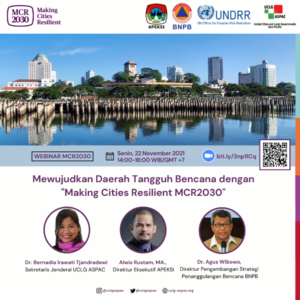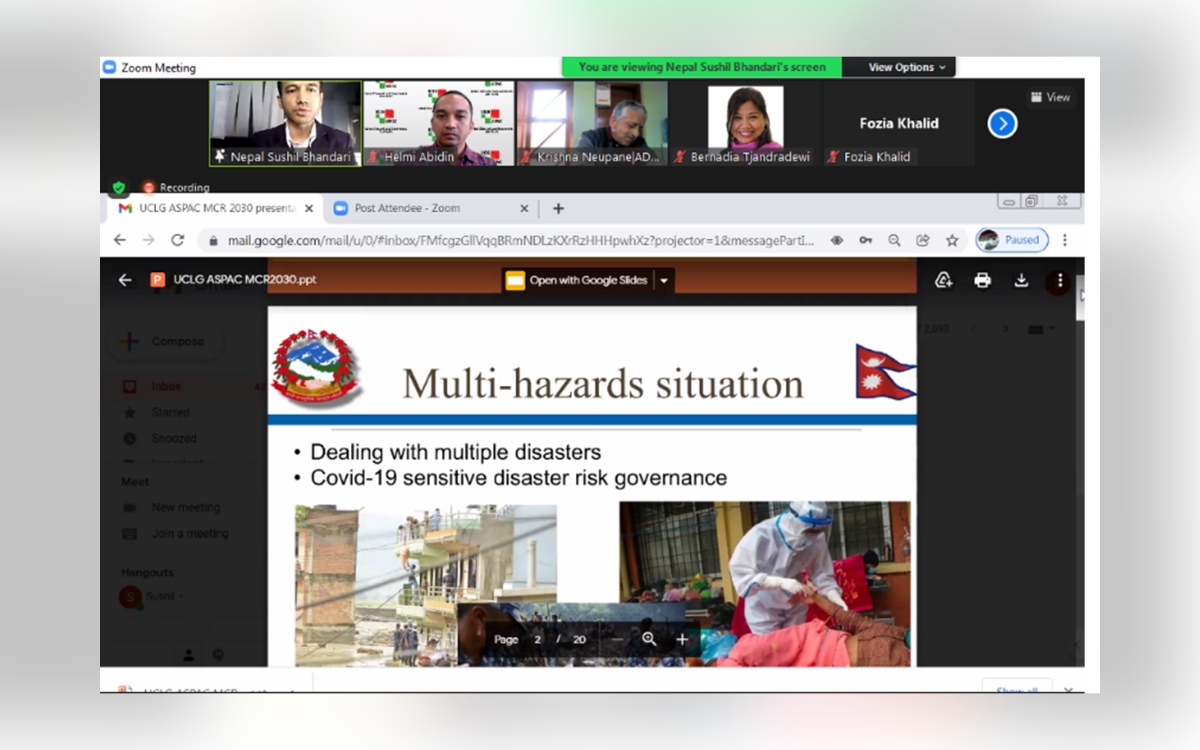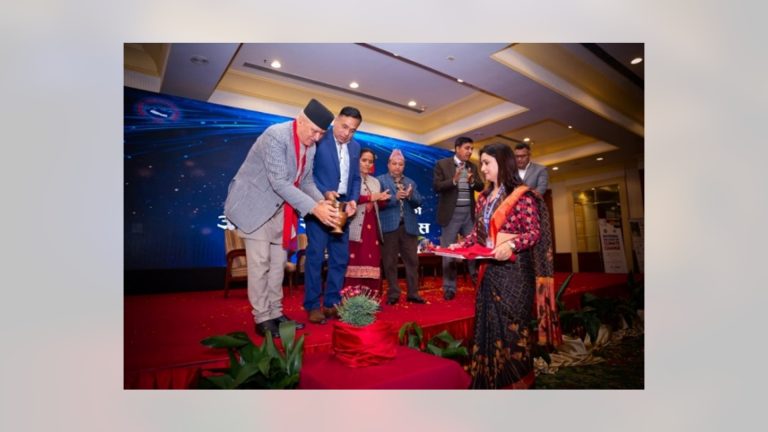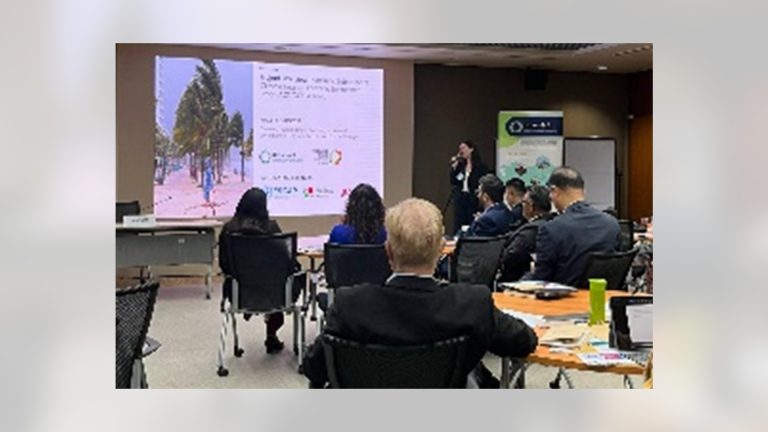November-December 2021 | UCLG ASPAC in cooperation with the United Nations Office for Disaster Risk Reduction (UNDRR) has been promoting Disaster Risk Reduction (DRR) and the Making Cities Resilient (MCR) over the past years. It has been strengthening the capacity of cities and local governments in DRR and the implementation of the Sendai Framework for Actions 2030.
 For advocacy, UCLG ASPAC has played its strong role to engage the city mayor for its active participation and knowledge sharing on lessons learnt and DRR policy framework at the regional level. A mayor with its best practice could inspire others to work together and give a bigger impact on the community. The target E of the Sendai Framework will be hard to achieve without the mayor’s commitment and good enabling factor and it will be one of the main issues during the Asia Pacific Ministerial Conference for DRR (APMCDRR) meeting and Global Platform (GPDRR) 2022.
For advocacy, UCLG ASPAC has played its strong role to engage the city mayor for its active participation and knowledge sharing on lessons learnt and DRR policy framework at the regional level. A mayor with its best practice could inspire others to work together and give a bigger impact on the community. The target E of the Sendai Framework will be hard to achieve without the mayor’s commitment and good enabling factor and it will be one of the main issues during the Asia Pacific Ministerial Conference for DRR (APMCDRR) meeting and Global Platform (GPDRR) 2022.
According to the UCLG ASPAC member database, there are 52 out of 122 cities (direct members) that have local plans/strategies/action plans and have integrated the Sendai Framework. To increase the number of local DRR plan/strategy in 2021-2022, UCLG APAC has set its target to reach a minimum of 100 cities having its local plan with full integration with the Sendai Framework and joining the MCR2030. To reach that target, capacity development training using UCLG Learning Module 1 and 2 on Resilience will be conducted to introduce the implementation of MCR2030 in the most prone disaster countries in Asia such as Bangladesh, China, India, Indonesia, Nepal, Philippines, and Sri Lanka. The capacity building/Training on Trainers (ToT) will involve the national government, local governments associations, and partners of the respective country.
Furthermore, UCLG ASPAC, along with UNDRR its regional core partner of MCR2030, will assist the implementation of MCR2030, primarily supporting at the strategic level by providing high-level inputs to ensure the strategy stays on track and the programme integrated with MCR2030 progresses according to key success measures. In addition, core partners will actively support MCR2030 by serving as peer reviewers and mentors as well as playing both partnership-brokering and advocacy-making roles. To achieve the MCR2030 regional target in 2021-2022, UCLG ASPAC organises a series of webinars/workshops and training of trainers (Module 1 and 2 Resilience) for local governments in the Asia-Pacific region. The event will be conducted virtually in collaboration with national local government associations, national partners, and related stakeholders.
The first MCR2030 Webinar was on 22 November 2021 held for Indonesian cities in collaboration with the Association of the Indonesia Municipalities (APEKSI) and the National Agency for Disaster Countermeasure (BNPB). The event was attended by 16 local government representatives and 100 participants from various levels such as cities, regencies, and provinces. The welcoming remarks were delivered by UCLG ASPAC Secretary General Dr. Bernadia Irawati Tjandradewi and Executive Director of APEKSI Mr. Alwis Rustam. Both UCLG ASPAC and APESKI addressed the commitment on MCR2030 advocacy and emphasised the role of UCLG ASPAC in facilitating training on the use of assessment tools (scorecard, 100RC) together with other local government associations and organising peer-learning workshops to document examples of smart practices and regional experiences in developing their DRR strategies.
Dr. Agus Wibowo, Director of Disaster Management Strategy Development of BNPB presented the key lecture and shared the Indonesia Government’s commitment to achieving the Sendai Framework for DRR targets in all aspects including local strategy and strong cooperation among stakeholders. He also mentioned that the national policy and regulation have been produced to facilitate the local government in implementing the DRR local action plan including the national master plan (Rencana Induk Penanggulangan Bencana/RIPB) for DRR 2020-2044 signed by the President of Indonesia. Through the MCR2030 initiative with an online dashboard, cities in Indonesia will have an opportunity to collaborate with national and international stakeholders in achieving global targets and resilience. Toward the Global Platform 2022 in Bali, BNPB will enhance cities and regencies to join the MCR2030 sign up and showcase the local lesson learnt and best practices to become an inclusive, safe, resilient, and sustainable city. In this webinar, Padang City shared the good practice on how to implement the local DRR strategy and part of the signed city for the MCR2030 dashboard.
The second Webinar on MCR2030 was organised on 21 December 2021 in collaboration with UNDRR, and three National Local Government Associations of Nepal (MuAN, ADCCN, and NARMIN). The event aimed to promote collaboration between cities and national associations of municipalities under the MCR2030 initiative and encourage members/cities to sign up for the MCR2030 through the online Dashboard (click: https://mcr2030.undrr.org/). The webinar was opened by UCLG ASPAC Secretary General and Mr. Krishna Chandra Neupane, Executive Secretary General of Association of District Coordination Committees of Nepal (ADCCN).
UCLG ASPAC Secretary General emphasised the new MCR2030 advantages as an online dashboard such as helping and supporting city to leverage their commitment and showing their up-to-date situation such as city risk profile, local DRR action plan and strategy implementation on minimising the gaps; and identifying the good enabling environment to achieve the resilience. By joining MCR2030 online, cities in Asia-Pacific will have access to tools, guidance, and capacity building to progress along with the resilience roadmap. “Among more than 700 cities in Nepal, we could have the annual target by at least 100 cities to take part in 2030. National Government (National Disaster Management Agency) could provide guidance or regulatory for LGs to join this MCR2030,” she added.
Mr. Krishna mentioned that the national government role is very important although still weak since Nepal is a newl democratic and federal state. ADCCN has signed up the MCR2030 dashboard and will encourage members to join the initiative.
Mr. Sushil Bhandari, National Disaster Risk Reduction and Management Authority, Ministry of Home Affairs, Nepal, in his keynote speech shared the hazards and risk profile including the recent regulations for achieving the global targets. He also shared that Nepal has also launched an online platform for cities seeking national government support in DRR and disaster response.
The presentation of city experiences on the local resilient through Making Cities Resilient 2030 (MCR2030) were delivered by representatives from Makati, the Philippines and Dhulikhel Municipality, Nepal. Example from Makati City was more on how to be a champion city in DRR and active collaboration experiences with multi stakeholders on implementing the local DRR strategy and being the MCR2030 network since 2013. Makati City has used the scorecard assessment for identifying the potential risks and analysing the gaps for building a resilient city. The Municipality of Dhulikhel shared the experiences on Disaster Risks Management activities such as fast response during the 2015 Kathmandu Valley Earthquake and strengthening the community to cope with future natural hazards and potential risks.
The MCR2030 clinic session was introduced by UNDRR and UCLG ASPAC representatives on online practice guidance on how to join the dashboard by creating an account using preventionweb.com. participants were guided to open the dashboard and answer the questions to identify the stage level. In the end, participants were asked to do a self-practice including a discussion. The webinar was closed by Mr. Richard Howard UN Resident Coordinator of Nepal a.i./ Director of the ILO Country Office for Nepal. He thanked the UCLG ASPAC and three LGAs (MuAN, NARMIN, ADCCN) for the collaboration and local representatives for their commitment and encouraged more cities and local governments in Nepal to join the MCR2030.











